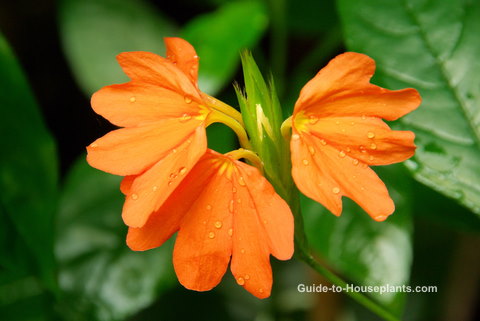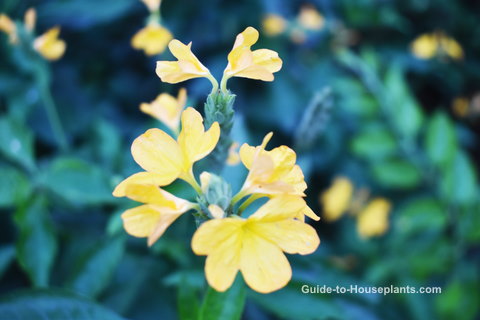Firecracker Flower
Firecracker flower, known botanically as Crossandra infundibuliformis, makes a stunning house plant that blooms dependably from spring through fall.

Get to Know Firecracker Flower
This perennial shrub has origins in Southern India and Sri Lanka.
This eye-catching houseplant sports bright and beautiful flowers that bloom for months. Orange flowers are most common, but other colors include salmon-red, yellow and pink. The flowers are held upright from green tubular bracts. Even young plants are eager to bloom, sending up clusters of flowers most of the year.
Several named cultivars are available, including 'Mona Wallhead' with salmon pink flowers...and 'Lutea' with golden yellow flowers.
Its deeply veined, glossy leaves grow in opposite pairs, growing up to 5 in (13 cm) long.
How big does flowering Crossandra plant get? You can expect it to grow up to 16 in (40 cm) tall.
In its native tropical habitat, this firecracker plant flourishes in the year-round warm temperatures and high humidity. Dropped leaves are sometimes a symptom of being exposed to cold air. Keep this flowering plant away from windows, doors or A/C vents, where it may be exposed to blasts of cold air. If the leaf tips turn brown, raise the humidity around it.
Did you know...
Crossandra infundibuliformis is in the Acanthaceae family.
This attractive clan boasts more than 2,000 species. Many are popular house plants, including Zebra Plant, Polka Dot Plant and Persian Shield. What many of them have in common is a brightly colored flower spike. Others have showy foliage. Some have both.
Repot in spring. Keep this flowering plant in a small pot because it blooms best when its roots are crowded. Use a pot with a drainage hole to prevent soggy soil.
Deadhead spent blooms. After the last flower on any flower spike dies, cut off the flower spike. Deadheading will promote more flowers.
Watch for spider mites that like dry conditions. Treat any infestation right away to avoid these pests from moving on to your other indoor plants. Raising the humidity around the plant discourages spider mites from invading.
Is it poisonous to pets? No. Pet owners can rest assured that Crossandra species are non-toxic and safe to grow in a home with cats and dogs.
Firecracker flowers make a beautiful addition to a group of other tropical plants. Bringing them together as a group helps to raise the humidity around them.

Firecracker Flower Care Tips
Light: Bright light. Some direct morning sun is fine, but keep shaded from hot midday sunlight. Plants that don't bloom aren't getting enough light. Move the plant to a brighter location where it will get filtered sunlight.
Water: Water thoroughly, allowing the top 1 in (2.5 cm) of soil to dry out between waterings. Don't allow the soil to get soggy because it will quickly kill the plant. Water less in winter, while plant is not actively growing. Remember to always use room-temperature water to water your tropical house plants; cold water is a shock to them.
Humidity: Moderate to high (around 50% relative humidity or above). Using a cool-mist room humidifier is the most effective way to increase moisture in the air.
Temperature: Average room temperatures 65-80°F/18-27°C year-round. This tropical native doesn't like the cold at all -- don't expose it to temps lower than 65°F/18°C. Also, keep Firecracker Flower out of cold blasts from windows, doorways and AC vents. Cold drafts may cause leaves to fall off.
Soil: All-purpose houseplant potting mix
Fertilizer: Feed every 2 weeks in spring and summer with a water-soluble fertilizer.
Propagation: Take 3 in (7.5 cm) stem tip cuttings in spring and pot them separately. Keep cuttings warm, lightly moist, and give them indirect sunlight. Crossandra infundibuliformis can also be grown from seed. Sow seeds in spring, barely covering them with moist potting mix. Use a seedling heat mat to maintain an even 70°F/21°C.


